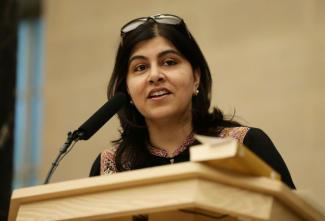Europe
Breaking Point

At first, Saeeda Warsi, the former chair of the Conservative Party, supported the Vote Leave campaign in Britain’s referendum on EU membership. She later changed her mind, but by then, Vote Leave had convinced 30 % of Britain’s South Asian voters. A large number of South Asians felt that the racial hatred which the Brexiteers were stirring up was limited to immigrants from Poland and other East European countries.
The truth, however, was that a crude mix of hideous attitudes was becoming evident – it included colonial supremacism, xenophobia, paranoia and racist hatred. What Brexiteers really wanted was freedom from diversity.
Seventy percent of South Asian Brits had understood that all along. The signs had been obvious. Indian kids, for instance, knew that others in their age-group often claimed to smell curry near them, and Pakistanis were called “Pakis”. The ghosts of earlier white supremacist organisations had been resurrected in the UK Independence Party and other Leave-promoting entities.
Making matters worse, South Asian communities remained ghettoised and estranged from eachother. Pakistanis, Indians, Bangladeshis, Nepali and Sri Lankans do not mix much in Britain, displaying their own brands of nationalistic arrogance, divisiveness and religious fundamentalism.
One week before the referendum, Jo Cox was killed. As a Labour member of parliament, she had campaigned for the Remain side. Her killer shouted “Britain First”. So far, it looks as if he was not linked to the far-right group called Britain First. It has the habit of threatening prominent Muslims and has disrupted life at London’s largest mosque. It runs “knife defence” camps in the Welsh mountains. The group only has a few hundred members, but almost 1.5 million likes on its facebook page. Reportedly, there are 100 hate-based crimes every month, and people say the situation has become worse since the vote, though there are no solid statistics yet.
Governments, private-sector leaders and the media are now busy trying to calculate the economic fallouts of Brexit. Among foreign investors in Britain, Indians are the third biggest national group. Some 6,000 Indian doctors and 20,000 Indian nurses work for the National Health Service. Many other Indian professionals are high-earning accountants, lawyers and corporate managers. Will they still be welcome in post-Brexit UK? No one can say. Will the remittances that migrants send home to South Asia decrease? No one knows.
Britain is one of the most important foreign-trade partners for Pakistan, Sri Lanka, Bangladesh and Nepal and has served as these countries’ patron saint in relations with the EU. London helped them get GSP plus status in relations, for instance. GSP stands for Generalised Scheme of Preferences, and duties are lower or cancelled for countries that have this status. Britain, so far, has also been a major donor of official development assistance (ODA). What will Britain’s future ambitions be, and will its government still have international clout? No one can tell.
What looks obvious, however, is that Brexit will boost extremist attitudes and identity politics. Afzal Khan is of Pakistani origin and a British member of the European Parliament. He argues that Brexit is a bad sign for UK as a lighthouse of modernity and cultural diversity. Dinesh Bhattarai, a former Nepali ambassador to the UN, warns that the Brexit decision can boost the “confidence of radicals and fanatics” in his country and, more fundamentally, puts the “entire liberal order into question”. Khaled Farooqi, a Pakistani journalist based in Brussels, reckons: “Brexit will embolden and strengthen all kinds of religious extremists and radicals of UK and Pakistan. It is their heavenly gift.”
Ceciel Shiraz Raj is a member of the Human Rights Commission of Pakistan and the Pakistan-India Peoples Forum for Peace and Democracy. He lives in Brussels.
shirazraj@hotmail.com







